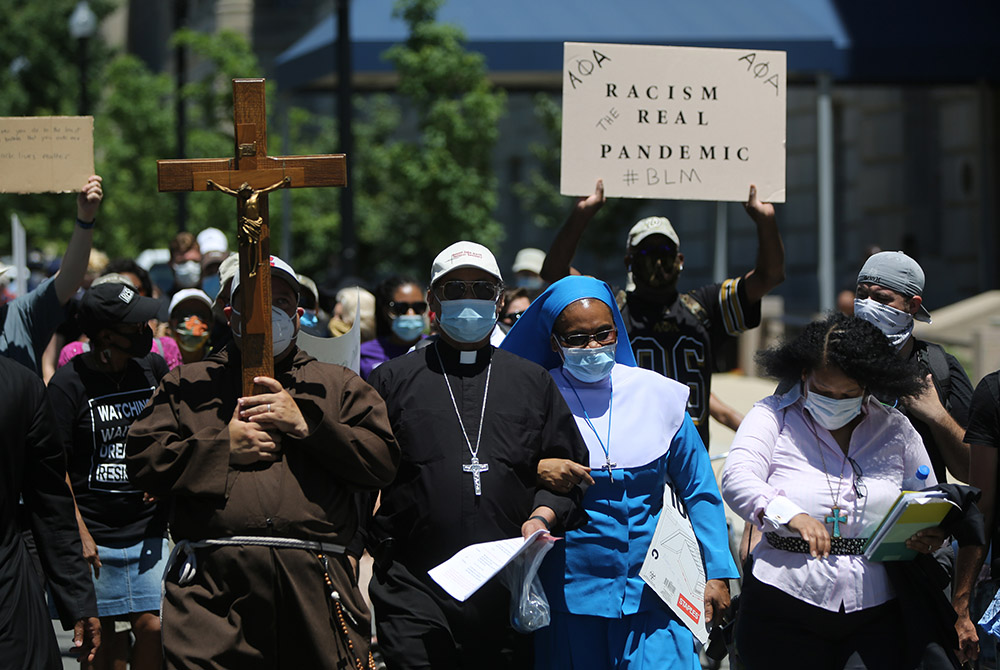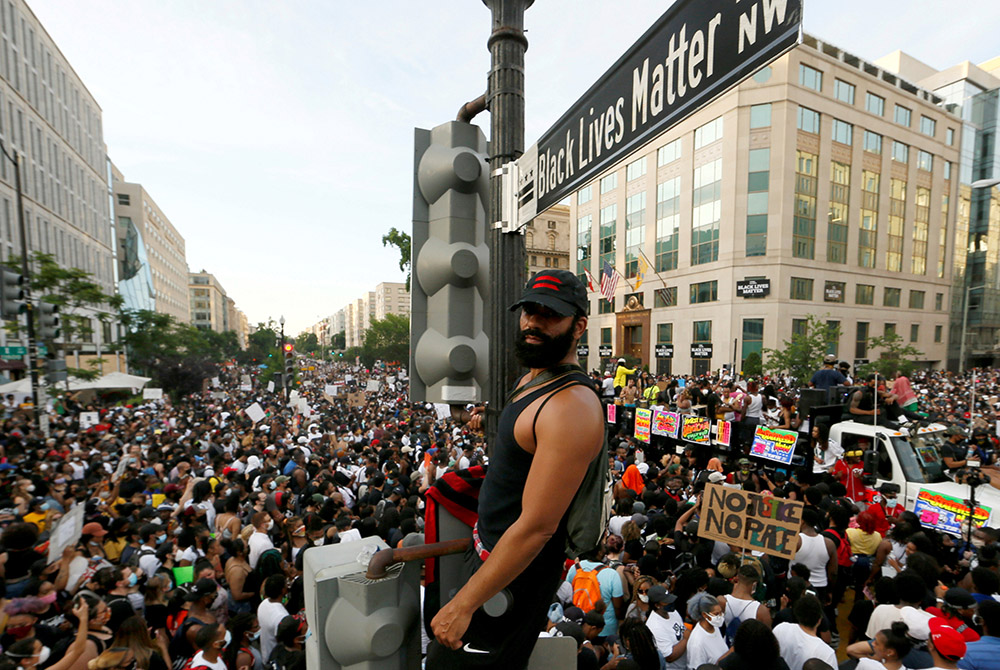
Washington Auxiliary Bishop Roy E. Campbell and a woman religious walk with others toward the National Museum of African American History and Culture June 8 during a peaceful protest following the death of George Floyd. (CNS/Bob Roller)
"Listen carefully, my child, to my instructions and attend to them with the ear of your heart. This is advice from one who loves you; welcome it and faithfully put it into practice. The labor of obedience will bring you back to God from whom you had drifted through the sloth of disobedience" (Rule of St. Benedict translation from The Rule of St. Benedict: A Spirituality for the 21st Century, by Benedictine Sr. Joan Chittister).
"Listen carefully … with the ear of the heart," means listening to the teaching of St. Benedict and of Scripture. Our instructions also come from listening more deeply to the people in our lives and communities as we talk, read their words or witness their stories in the news. Deep listening means attending to what people say, their emotions and what remains unspoken.
Listening anew since May's end, the ear has heard chants of "no justice, no peace," "Black lives matter," "hands up, don't shoot," "I can’t breathe," "no more" and "in November, next." The ear has heard idolatry, misuse of religion, "calls for law and order," domination.
The ear has heard calls for apologies offered, bigotry challenged and admittance of wrong. The ear has heard calls for mercy, for resistance, silence for almost nine minutes. The ear has heard some violence condemned and other violence condoned. The desire for change, the desire to be taken seriously. The prayer of wondering how long, O' Lord?
Listening anew since May's end, the heart heard and continues to hear — pain, agony, terror, rage, sorrow. The heart hears frozenness, disbelief, weariness and exhaustion. Listen more and the heart hears commitment, perseverance, accountability, demands for justice. The heart hears embarrassment, conviction, opposition, fear.
The heart hears a desire for the status quo, desire for change, hope, despair, resilience, wrestling. The heart hears anxiety, guilt, shame, regret; do your own internal work, give us space. Be willing to fail as you seek conversion. The heart gives and receives love, mercy, compassion and a passion for justice.

Demonstrators against racial injustice are seen June 6 in Washington near the White House. (CNS/Jim Bourg, Reuters)
Deep listening instructs and teaches us about how we participate in sin and where grace resides. Those of us who are white need to listen deeply with the ear of our hearts to the various teachers (friends, colleagues, family members, students, neighbors and strangers) who once again protest injustices we too readily ignore.
By allowing our teachers' pain, agony and sorrow into our hearts, we confront the reality that as whites we too cause their pain, agony and sorrow. This truth must be a source of ongoing, daily conversion.
A conversion of our broken, hardened hearts to the heart and mind of Christ. A conversion that requires turning from the privileges our white skin grants us toward a justice necessitating that we sacrifice our comfort and privilege for the well-being of others. A conversion to resist racism and become anti-racist.
A conversion to be silent no longer as we choose to join the chorus and the fight to change unjust systems. A conversion acknowledging and naming our mal-formation and thus begin the process of our re-formation.
Fr. Bryan Massingale's recent essay shines a direct light onto aspects of our malformation — the assumptions we make from our white privilege that lead to violence against black, brown and other toned peoples.
Massingale instructs us with practices to undertake:
- "Understand the difference between being uncomfortable and being threatened."
- Sit with the hard truth that "the only reason for racism's persistence is that white people continue to benefit from it."
- "Admit your ignorance and do something about it."
- "Have the courage to confront your family and friends."
- Be "unconditionally pro-life," and:
- Pray.
As I reflected upon these practices and prayed, I returned to the experience of watching and listening in horror as President Donald Trump ordered crowds dispersed — with rubber bullets and pepper spray — so he could take a photo-op in front of St. John's Episcopal Church.
As Trump posed with a Bible, "NOT my Christianity" I screamed inside my head, as my stomach reeled and my breath caught. Simultaneously other thoughts flashed through my head:
"The prophets champion justice. James Cone and others have called out and critiqued the conflating of white supremacy and Christianity. Massingale on the racism in the Catholic Church. M. Shawn Copeland on the wounds inflicted on the black and brown Body of Christ. Fr. Karl Rahner’s homily about the foot of the dictator on his parishioners’ neck: our black, brown, olive-toned, and other skin toned fellow human beings live this reality."
Even though some swiftly denounced Trump's photo-op, why did some Christians praise this event, an idolatrous misuse of religion? What fosters "the drifting" from God "through the sloth of disobedience," as St. Benedict's rule describes — a disobedience that leaves white privilege and white supremacy unchallenged?
A disobedience that permits the persistence of anything that dehumanizes and wounds other people (whether racist, misogynistic, heteronormative, the list is long). A disobedience that drowns out the call of the prophets. A disobedience that ignores Jesus Christ’s demands of discipleship to dismantle injustice, to heal wounds, to repent and reform so we live more authentically fostering human dignity and justice.
Anselm of Canterbury’s atonement theory, I think, is part of the problem. His satisfaction atonement theory teaches that humans' sinful behavior created a debt so big it could not be paid to God. Therefore, God sent his son, both human and divine, to pay our debts. Jesus Christ saved us, paid our debts. Our balance sheet wiped clean. Our salvation received by Jesus’ sacrifice: a sacrifice of blood, life, breath.
Advertisement
Does a satisfaction atonement theory live in white Christians imagination and our inability to confront our role in racism and other injustices because we collectively created structures of evil that we think are too big for us to change? Do we unconsciously think someone else needs to pay our current sinful debt?
One answer stares us in the face. George Floyd, Breonna Taylor, Ahmaud Arbery, the missing Native American women, the missing women in Tijuana, and so many others are the sacrificial lambs paying for the sins of racism and white supremacy. They pay with their blood, their life, their breath.
Social Service Sr. Anne Arabome describes her experience, and by proxy the experience of innumerable people of sacrificing life and breath for white people, in her June 10 piece, "I can’t breathe because God can’t breathe."
White Christians are killing Jesus Christ again and again as we sacrifice our black, brown, olive toned fellow human beings on the altar of white privilege and white supremacy.
Jesus did not need to be crucified for us to be saved, nor do black and brown human beings need to die today.
St. Joseph Sr. Elizabeth Johnson, a feminist theologian, argues in her 2018 volume Creation and the Cross: The Mercy of God for a Planet in Peril that a satisfaction atonement theory does not account for the fullness of God’s mercy, love, and forgiveness found in Scripture. God could save us without Jesus needing to die.
Jesus preached the need for conversion, for changing structures that oppressed or pushed people to the margins. Jesus required people to take responsibility for their actions and sins. The cross and Jesus' death on it was the result of his life and his challenging injustice.
Jesus did not need to be crucified, yet he was, and he rose again. We celebrate this resurrection; a resurrection that shows us that violence and suffering is not the last word. God brought and will be bringing again something new. Jesus, after he rose, fulfilled his promise to the disciples to send the Holy Spirit, the spirit of new life, of renewal.
As fires burned in D.C., Minneapolis, Boston and elsewhere, I wondered what is the Holy Spirit bringing forth? Where is the spirit moving in the evocative rage, in the images of red, orange, yellow against the night sky?
Will white Christians enter this turbulent space and by the labor of our obedience (an obedience to listen, to learn, to return to God) work with others to dismantle idolatry in all its forms?
Will we respond to the call of our teachers to seek healing from all disease that prevents us from seeing each other as members of the One Body of Christ, as equal in dignity, worth and bearing the image and likeness of God?
And in responding to the Holy Spirit and our teachers of the New Pentecost, work to build the community called for by Arabome, where all are "able to breathe with both lungs no matter the color of our skin."
[Kathy Lilla Cox is a theologian and a visiting research associate at the University of San Diego.]






